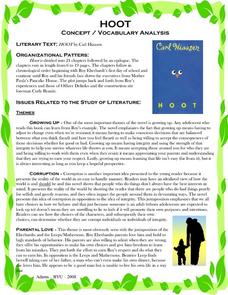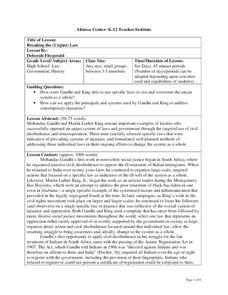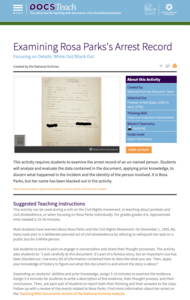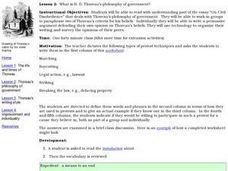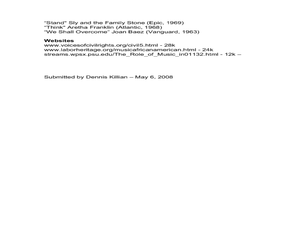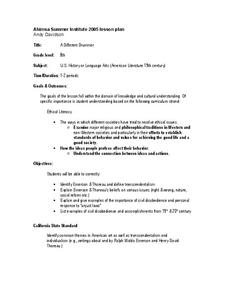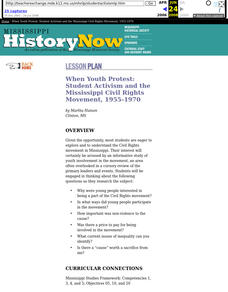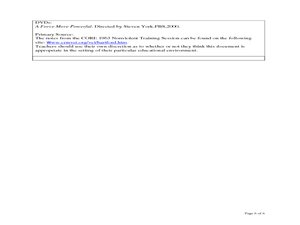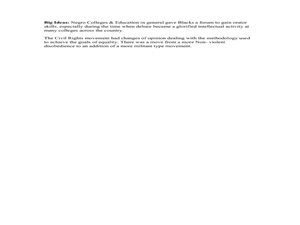K20 LEARN
Plessy v. Ferguson: An Individual's Response to Oppression
After generating research questions rated to segregation, groups are given a primary source document (Jim Crow Laws, Black Codes, Plessy v. Ferguson, etc.) and craft a presentation that details the key elements of their assigned...
Curated OER
Hoot: Concept/Vocabulary Analysis
Augment your unit on Carl Hiaasen's Hoot with a series of activities about the environment, civil disobedience, making an impact in the world, and growing up. A list of literary concepts and themes helps you to write your lessons to...
Curated OER
Breaking the Unjust Law
Students consider the concept of civil disobedience. In this lesson on changing unjust laws, students use primary sources to understand how Gandhi and King changed the law. Students will then list laws that they feel are unjust and plan...
DocsTeach
Examining Rosa Parks's Arrest Record
There aren't a lot of details on the document, but Rosa Parks's arrest is now a legendary story of the civil rights movement. Class members examine the record—with Parks's names blotted out—to see if they can tell who this document...
Curated OER
The Civil Rights Movement
Young scholars explore the events of the Civil Rights Movement. In this research skills lesson, students research the important figures, events, and ideas of the American Civil Rights Movement as they visit suggested websites that...
Facing History and Ourselves
The Audacity of a Vote: Susan B. Anthony’s Arrest
Susan B. Anthony's speech "Is It a Crime for Women to Vote?" takes center stage in a lesson that asks class members to consider how they might respond to what they consider an unjust law. Groups work through the speech paragraph by...
Curated OER
H.D. Thoreau's Philosophy of Government
Students read an essay by H.D. Thoreau as analysis of his philosophy on government. In this Thoreau analysis lesson, students work in groups to paraphrase two of Thoreau's criteria for his beliefs about government. Students write a...
Stanford University
Lesson Plan: The Children's Crusade and the Role of Youth in the African American Freedom Struggle
Young people played significant roles in the Civil Rights movement. Class members examine the contributions of Barbara Johns, Claudette Colvin, Mary Louise Smith, and the children of Birmingham,...
Curated OER
Understanding the Music of the Civil Rights Movement
Students examine protest music and songs from the Civil Rights movement. In this music of the Civil Rights era lesson, students listen to selected music before working in groups to determine who the music was directed at, what social...
Curated OER
Abolitionists in U.S. History
Learners read and discuss excerpts from the writings of Henry David Thoreau, Frederick Douglass and Sarah Parker Redmond. They compare and contrast the views of the three abolitionists concentrating on the experiences and reasons for...
Curated OER
A Different Drummer
Eighth graders investigate philosophy and meditation techniques by discussing Emerson and Thoreau. In this philosophical traditions lesson, 8th graders identify the men Ralph Waldo Emerson and Henry David Thoreau, their work, and...
Curated OER
Satyagraha, Its Origins and Applications
Tenth graders study the steps and methods taken by Gandhi. In this World History lesson, 10th graders create illustrations to represent these steps. Students write a persuasive essay on these measures taken by Gandhi.
Curated OER
Keep on Pushing: Popular Music and the Civil Rights Movement
Students explore music that exemplified the Civil Rights Movement. For this music and history lesson, students research 1960's protest songs, Motown recorded music, and rap of the 1990's to consider the power of music and its reflection...
Facing History and Ourselves
Laws and the National Community
When it comes to the law, is justice always served? Teach scholars about how law sometimes enables prejudice of entire groups of people with a unit on World War II that includes a warm-up activity, analysis of primary sources,...
PBS
Civic Engagement and How Students Can Get Involved
There is no age limit on civic engagement. Even if your pupils are not old enough to vote, they are old enough to get involved. Show them how with a PBS lesson that underscores the importance of civic participation and models ways young...
Curated OER
Mohandas Gandhi
In this online interactive history quiz worksheet, students respond to 50 multiple choice questions about the accomplishments of Mohandas Gandhi. Students may submit their answers to be scored.
Facing History and Ourselves
Life for German Youth in the 1930s: Education, Propaganda, Conformity, and Obedience
The German youth faced an onslaught of propaganda when they went to school, thanks to the Nazi regime led by Hitler during World War II. Pupils relate their education experiences to German youth by analyzing primary source readings,...
Museum of Tolerance
The Price of Personal Responsibility
A reading of Patrick Henry's "Speech in the Virginia Convention," Henry David Thoreau's "Civil Disobedience," and Rev. Martin Luther King, Jr.'s "Letter from Birmingham Jail" launch a discussion about the price one is willing to pay to...
Curated OER
When Youth Protest: Student Activism and the Mississippi Civil Rights Movement, 1955-1970
Students explain the meaning of the following terms associated with the modern Civil Rights movement: segregation; integration; civil rights; civil disobedience.
National Endowment for the Humanities
Revolution '67, Lesson 2: What Happened in July 1967? How Do We Know?
Even in a world in which dozens of participants and curious onlookers record every controversial event, the basic facts of what happened are often in dispute. Revolution '67, Lesson 2 explores 1967 Newark, New Jersey using an examination...
National Endowment for the Humanities
Revolution '67, Lesson 1: Protest: Why and How
To some people, protesting is as American as apple pie, but the factors that lead to protests can be as confusing to veteran activists as to today's youth. Revolution '67 explores the riots in Newark, New Jersey as a case study. ...
Curated OER
An Eye for an Eye
Students watch a view introducing them to modern Indian History. During the film, they answer discussion quesitons and discover the concept of non-violent civil disobedience. They share their responses with the class and write an essay...
Curated OER
ON BECOMING A NONVIOLENT WARRIOR
Students examine the concept of non-violent social change. In this lesson on social change, students research and role play to demonstrate ways in which this might be accomplished while making connections to various events in history.
Curated OER
Civil Rights Methodology Martin Luther King, Jr. – Stokely Carmichael
Young scholars compare and contrast the visions of Martin Luther King, Jr. and Stokely Carmichael. In this African-American history lesson, students read speeches by each of the men and summarize the arguments made by each of them about...



